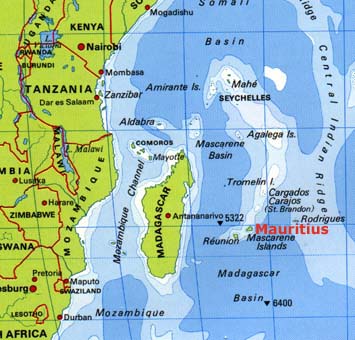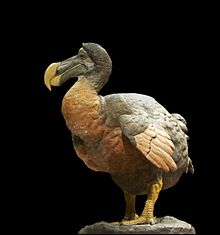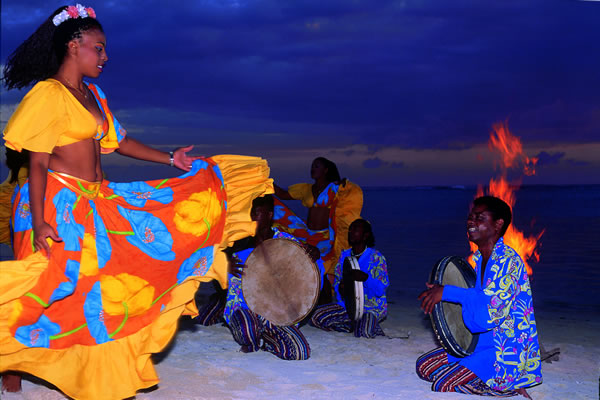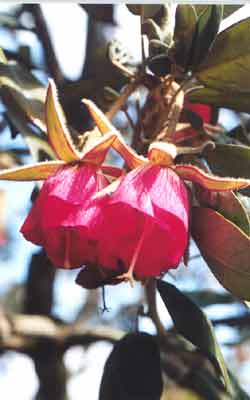
|
Mauritius, officially the Republic of Mauritius, is an island nation in the Indian Ocean about 2,000 kilometres (1,200 mi) off the south-east coast of the African continent. An island of volcanic origin with an area of 1,864 km2, it is almost entirely surrounded by coral reefs. The land rises from coastal plains to a central plateau where it reaches a height of 670 meters. The plateau is bordered by three mountain ranges, the highest peak, the Piton de la Petite Riviere Noire, rising to 828 m. It includes the eponymous main island of Mauritius and Rodrigues, Agaléga and St. Brandon. The islands of Mauritius and Rodrigues form part of the Mascarene Islands, along with nearby Réunion, a French overseas department. The capital and largest city, Port Louis, is located on Mauritius, where most of the population is concentrated. The country spans 2,040 square kilometres (790 sq mi) and has an Exclusive Economic Zone covering 2.3 million square kilometres. It enjoys a maritime sub-tropical climate with temperatures averaging 22° C on the plateau. |
 |
HistoryMauritius was known to the early Arabs traders as it can be found marked on their maps, but the first visitors from Europe were the Portuguese who landed in 1510. They used the island as a victualling stop on the way to Goa and Malacca but did not settle. The first attempt at colonisation was made by the Dutch who arrived in 1598 and named the island Mauritius after Prince Maurice of Nassau. They introduced sugar, Malagasy slaves and a herd of Javanese deer. But they were also heedlessly destructive and are said to be responsible for the disappearance of the magnificent ebony forests and the extinction of the famous dodo. They eventually abandoned their settlements in 1710. The French occupied the island which they renamed Isle de France between 1715 and 1810 and many place names are reminders of this period. In 1810 with the British take-over, the name reverted to Mauritius. The abolition of slavery lead to the importation of Chinese and Indian indentured labourers, who were followed by traders of their own nationalities. Mauritius gained independence from Britain on 12 March 1968 and since then has been an independent sovereign nation within the British Commonwealth. On 12 March 1992, Mauritius became a Republic. |
|
Dodo
Dodos were descendants of a type of pigeon which settled in Mauritius over 4 million years ago. With no predators to attack them, they lost their need and ability to fly. They lived and nested on the ground and ate fruits that had fallen from trees. There were no mammals on the island and a high diversity of bird species lived in the dense forests. In 1505, the Portuguese became the first humans to set foot on Mauritius. The island quickly became a stopover for ships engaged in the spice trade. A large number of dodos were being killed for food as it was a source of fresh meat. Later, when the Dutch used the island as a penal colony, pigs and monkeys were brought to the island along with the convicts. Many of the ships that came to Mauritius also had uninvited rats aboard, some of which escaped onto the island. Before the arrival of humans and other mammals, the dodo had little fear from predators. The rats, pigs and monkeys ate dodo eggs in the ground nests. The combination of human exploitation and introduced species significantly reduced the dodo population. Within 100 years of the arrival of humans on Mauritius, the once abundant dodo became a rare bird. The last one was killed in 1681. |
 |
LanguageThe official language is English - but the most widely spread is French and the local dialect, Creole. Teaching is in English but written and spoken press predominantly in French. Most Mauritians also speak their native language such as Hindi, Chinese, Urdu, etc... |
|
SegaThe most typical folkloric dance of Mauritius is the "Sega" of African origin. This dance is pulsated by the beat of the ravane, a circular drum, and other rhythmic instruments like the maravane and triangle. Danced and sung by the slaves, the Sega has been adopted by all Mauritians and is played on all occasions. More recently, a new sound, a mixture of the Sega and Reggae music, has found its way in our musical culture. This fusion music called the Seggae, a melodious and entertaining new rhythm that reflects the mixed aspect of Mauritius, emerged in the 80's. Originally the music of the Rastafaris and the poor suburbs of Port Louis, it has found its way to the nightclubs and the mainstream of Mauritian local music. |
 |
|
National Symbols |
National Flag
RED - represents the struggle for freedom and independence YELLOW - represents the new light of independence shining over the island |
National AnthemAn open competition for the composition of the lyrics of the National Anthem for Mauritius was launched in 1968. The award went to the entry forwarded by the well-known Mauritian poet, Jean Georges Prosper, MBE.
Listen National Anthem |
National FlowerTrochetia is a genus of flowering plants endemic to the Mascarene Islands. There are five species of Trochetia in Mauritius. The most popular one is Trochetia boutoniana (‘Boucle d'Oreille’) which is the national flower of Mauritius since 12 March 1992. It was named after French botanist Louis Bouton. The only known wild source population used to be the slopes of Le Morne Brabant. The flowering time is from June to October. This bell-shaped flower has since then been successfully propagated and has been reintroduced in the wild and in private and public gardens in various location in the island. The genus Trochetia consists of scrubs or small trees, which can reach a height from two to eight meters. The flowers are either white (T. triflora), pink (T. parviflora), or reddish orange (T. boutoniana). They are either single-standing, or grow in a cluster of three flowers. Some species have bell-shaped petals. The habitat consists of humid forests with a high annual rainfall or mountainous slopes which are directed windwards |
Coats of Arms
The coat of arms of Mauritius are stipulated in the "Mauritius Laws 1990 Vol 2 Schedule (Section 2)". In the lower left quarter is a key and on the right-hand side is a white star, which are referred to in the Latin motto "Stella Clavisque Maris Indici" meaning "Star and Key of the Indian Ocean". The armorial ensigns and supporters of Mauritius are described as (a) for arms- (i) quarterly azure and or, in the first quarter a lymphad of the last (ii) in the second , 3 palm trees eradicated vert, (iii) in the third, a key in pale the wards downwards gules, and (iv) in the issuant, from the base a pile, and ain chief a mullet argent and (b) for the supporters- (i) on the dexter side, a dodo per bend sinister embattled gules and argent, and (ii) on the sinister side, a sambur deer per head embattled argent and gules, each supporting a sugar cane erect proper, (c) with the motto "Stella Clavisque Maris Indici”
Colour Code Azur - Royal Blue (Pantone Reflex Blue) Or - Gold (Metallic Gold) Vert - Emerald Green (Pantone Green) Gules - Warm Red (Pantone 2X) Argent - Silver (Metallic Silver)
|



